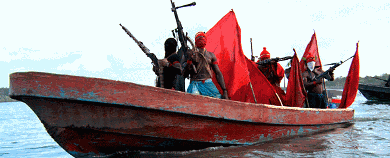
Louis Sicking receives NWO grant for Maritime Conflict Management in Atlantic Europe
Louis Sicking's Maritime Conflict Management in Atlantic Europe was awarded an 'Internationalisation in the Humanities' grant from NWO. What can we learn from how maritime conflicts were managed in the past?
Piracy has returned to the list of urgent problems facing Europe in the last decade. Global shipping has literally been held hostage to bands of pirates around the Horn of Africa and the waters of West-Africa. Yet prosecuting piracy is complicated by overlapping jurisdictions and complicated mechanisms for enforcing international law.
Maritime Conflict Management (MCM) comprises of conflict enforcement (naval warfare, privateering, piracy and blockades), conflict resolution (formal judicial and administrative procedures and informal or private means) and conflict avoidance (negotiations). What significance did MCM have in shaping the standards of diplomacy and international law in pre-modern Atlantic Europe (1200-1600)?
 The goal of this program is to create an international platform for the study of the methodological problems linked to an analysis of the various manifestations of MCM in pre-modern Atlantic Europe. Attention will be given primarily to the ways in which MCM changes and adapts when existing traditions collide with new political and economic realities.
The goal of this program is to create an international platform for the study of the methodological problems linked to an analysis of the various manifestations of MCM in pre-modern Atlantic Europe. Attention will be given primarily to the ways in which MCM changes and adapts when existing traditions collide with new political and economic realities.
Set against the background of changing political and commercial settings, the central questions of this program revolve around the necessity of commercial interdependence on the one hand and the shifts in the interests of states, regions, and towns on the other. The study of these dynamics will clarify the continuities and changes in MCM along Europe’s Atlantic coast. The ways in which Atlantic MCM was similar – or not – to both Mediterranean and Baltic conflict management is a key element.
The programme will be executed with partners at the Universities of Santander, La Laguna, La Rochelle and Nova University Lisbon.
